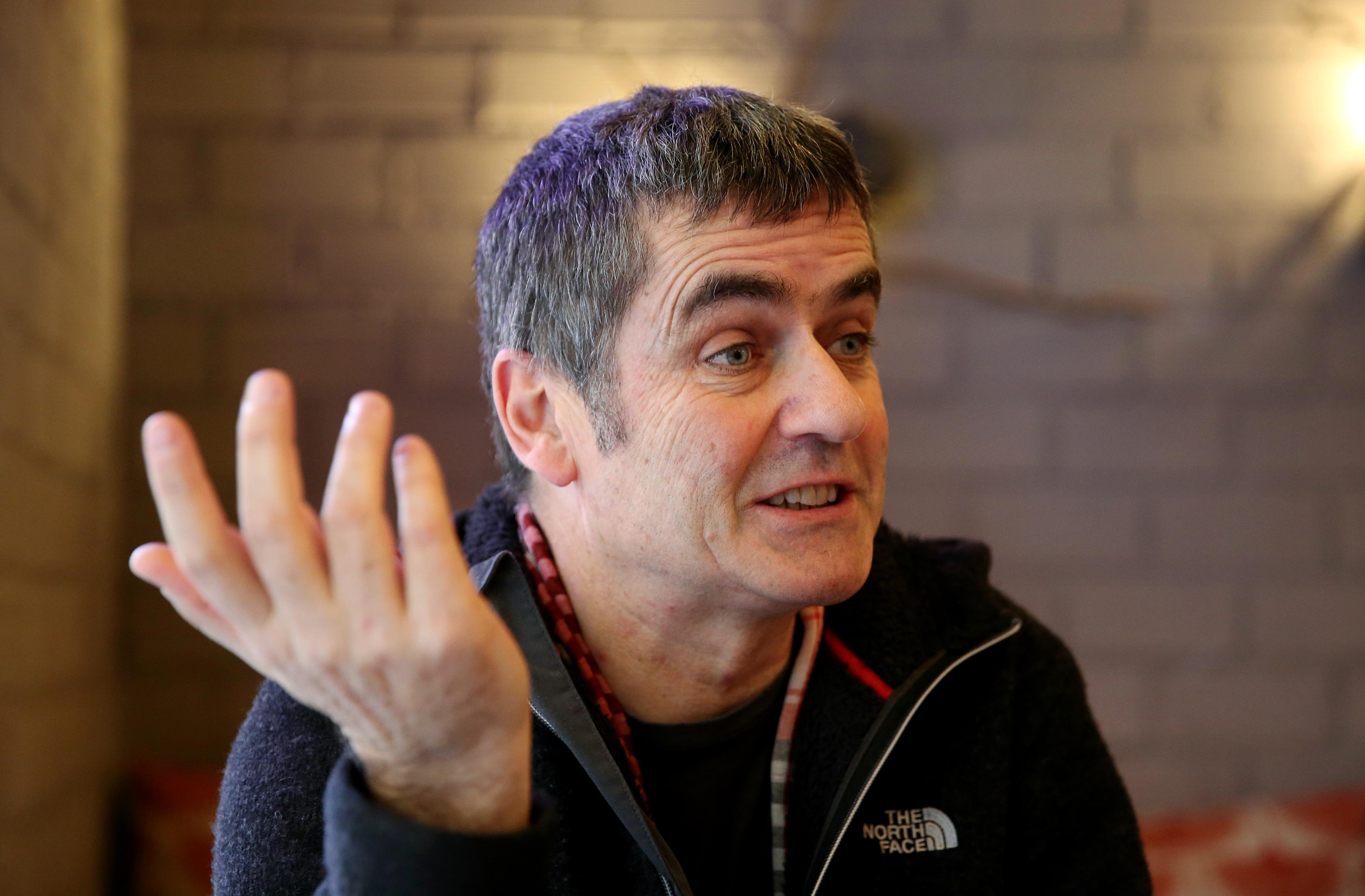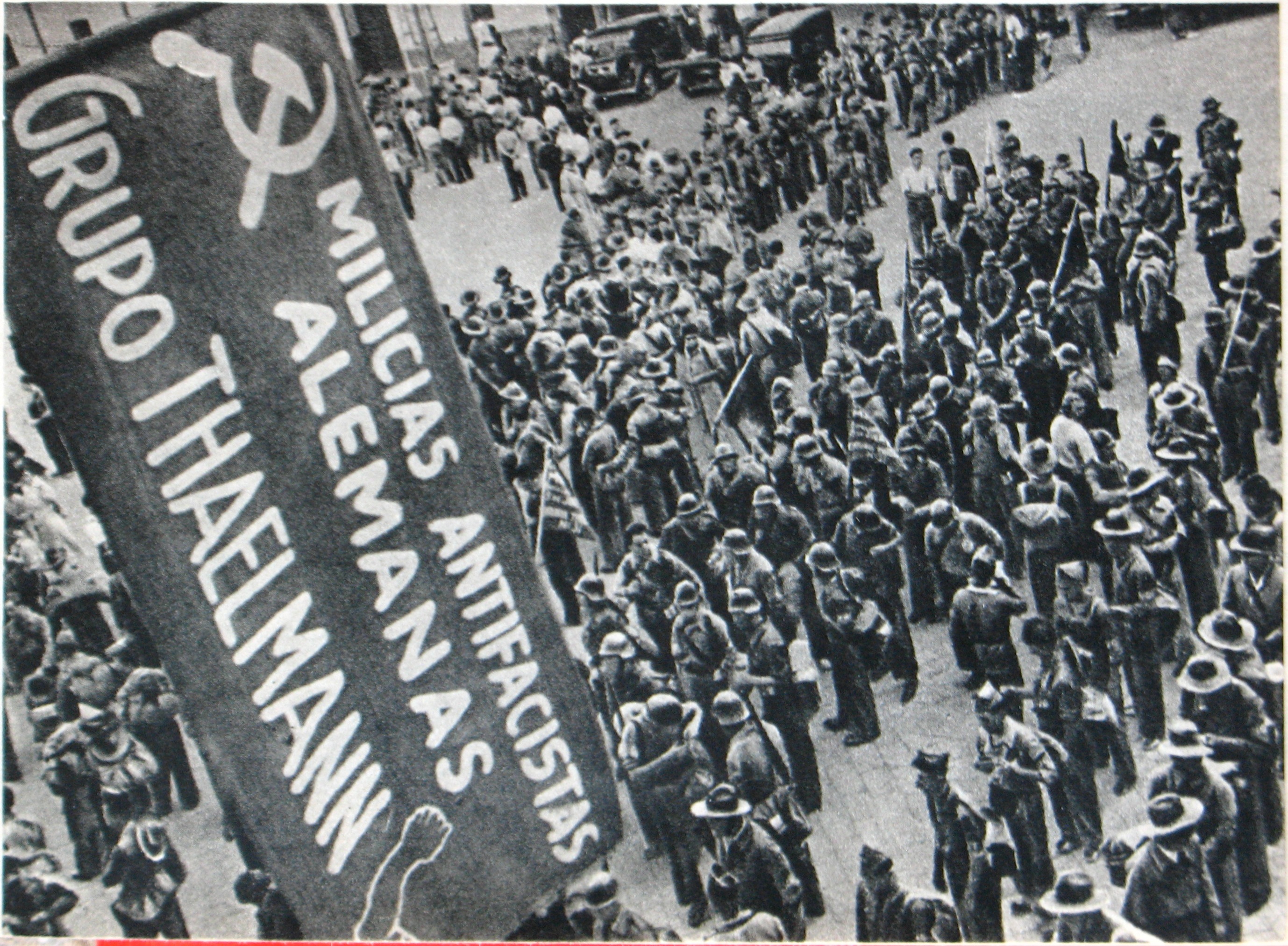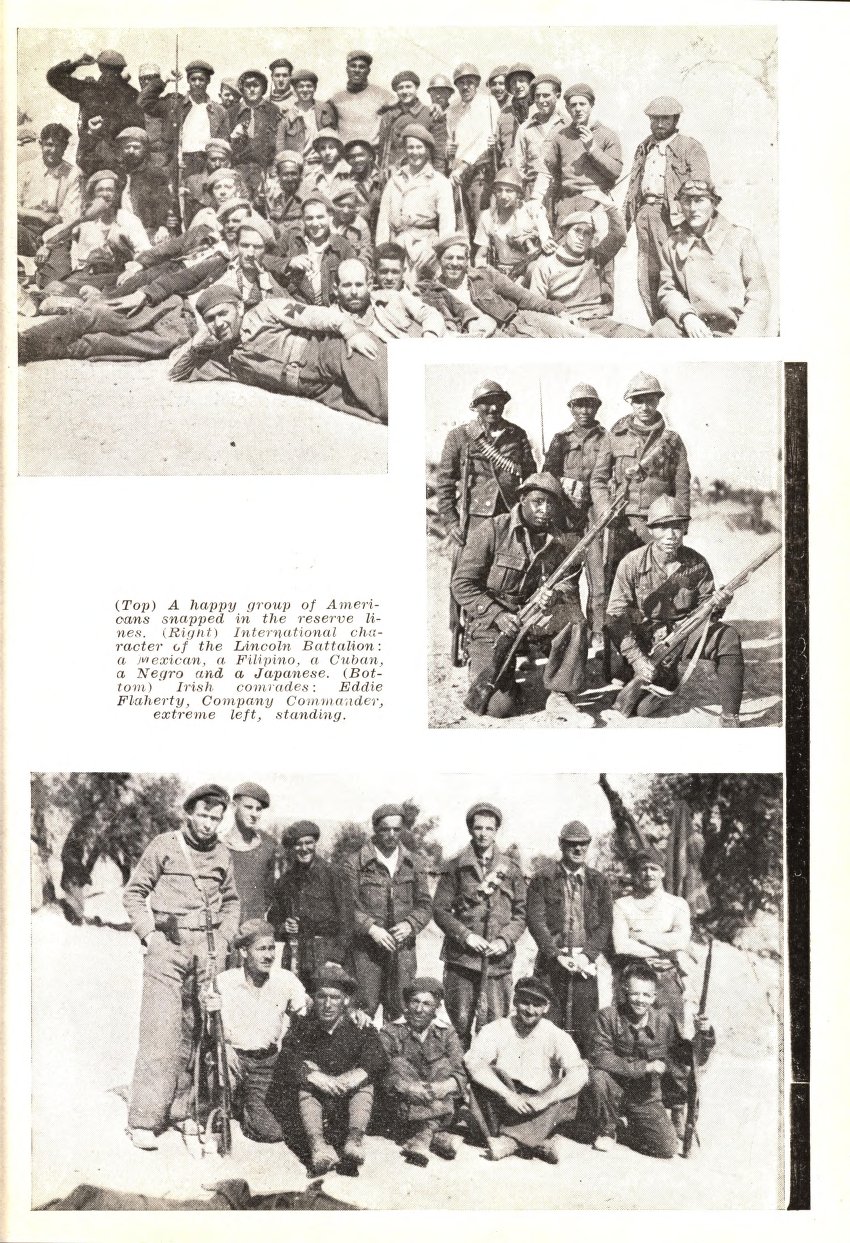Giles Tremlett: “The International Brigades Were Not an Outfit of the Communist International—They Were Antifascists.”
Giles Tremlett, long-time correspondent in Madrid, is finishing a major new book on the 35,000 volunteers from all over the world who flocked to Spain to help defend the Second Spanish Republic against fascism.
As Giles Tremlett sits down for a cup of coffee on a sunny morning in Madrid in late June, he plunks a bound manuscript on the terrace table (“Just to prove that it exists,” he jokes): a major new history of the International Brigades who fought with the Loyalist forces in the Spanish Civil War. The heavy tome looks impressive, but Tremlett is not quite done. For one thing, his editor hasn’t read it yet. “For another, it’s about 40,000 words too long,” he says. Still, if all goes well, it’ll be published next summer.
“I want to help my readers understand what it would have been like to be there.”
Born in Plymouth, UK, in 1962, Tremlett has lived in Madrid for more than twenty years. In addition to a long stint as correspondent for The Guardian and The Economist, he has written Ghosts of Spain (2007), Catherine of Aragon (2011), and Isabella of Castile (2017).
Your last two books are about Spanish queens from a long time ago. How is it to be back in the 20th century?
It’s wonderful, frankly. My only problem has been the sheer limitlessness of the source material. My research has taken me all over, from the Hoover Institution at Stanford to the Tamiment Library in New York, to Amsterdam, Warsaw, Belgrade, Paris…
In addition to being limitless, your sources come in many different languages.
Yes, that was an additional difficulty. I can read a bunch of languages myself; those that I cannot, I put through Google Translate to get an idea. If I see something I like, I find a proper translator. And then there is the problem of reliability. There’s been plenty of censorship or self-censorship in the thousands of IB memoirs. Over the years, some stories have clearly been improved through the retelling. Many people, for example, report sightings of Marshall Tito here, there, and everywhere—when he wasn’t even in Spain! He helped recruit volunteers but never made it over…
“There’s been plenty of censorship or self-censorship in the thousands of IB memoirs.”
This is your third history book. Do you still write like a journalist, or have you become a full-blown historian?
Where’s the line? You tell me, I don’t know. I am deeply interested in personal stories and experiences. I want to help my readers understand what it would have been like to be there.
That biographical approach means you have to select particular individuals. Did you pick people whose experiences you believe are representative? Or simply those that make for the most compelling stories?
Actually, some of the most interesting people did not make it into the book, precisely because they are a bit too interesting. Some of the most obvious characters, like Robert Merriman, are mentioned much less frequently than in other books. In fact, I purposely tried not to concentrate on the British and American volunteers. They have a strong presence in the literature but were numerically less important than, for example, the French and Belgians.
Did you have a chance to interview veterans?
Over the years, I’ve interviewed maybe a dozen. But I honestly did not feel a strong need to do interviews. The material is rich enough. And memory is not all that trustworthy seventy or eighty years after the fact. That said, the fact that the generation of the volunteers has now almost completely disappeared makes this a good moment to try to tell the whole story, moving beyond all the separate histories of the different national groups, which all are heavily influenced by their own national narratives. The Lincoln Brigade is a good example.
What does it mean to understand all those different narrative strands in the wider context of the 1930s?
The world of the 1930s is not a very globalized world yet—though it’s about to be. For many volunteers traveling to Spain, all that crossing of frontiers, was quite challenging, even just in cultural terms. After all, some 95 percent were working class. Many had never been outside their own country.
Still, the Brigades attracted internationally-minded people, including immigrants and children of immigrants.
In my book, I use two big categories, which I call “the devout” and “the displaced,” and which often overlap. In addition to the politically devout, of which there were many, those whom I call the displaced had an experience of migration. Then, of course, you had the sailors, of whom there were a lot among the Scandinavians, Americans, and Canadians.
Writing about the Brigades means you enter a political minefield. Were they heroes or dupes? Do you focus on the stories of courage and inspiration, or on those of disenchantment and desertion? As we all know, the history of the IB has been used to serve many different purposes, not least during the Cold War.
What I write is that war is a very binary thing. Normally, there are only two sides, and you have to choose one, however imperfect both sides might be. So which side do you choose? The answer may seem blindingly obvious to us now, but it clearly wasn’t at the time. Otherwise, the Brigaders wouldn’t have suffered so much in their own countries after the war—not to mention the whole non-intervention pact.
Now, to me, it is clear that there is one definition that fits almost all of the international volunteers. Some might be “Mexican” Comintern operatives sent by Moscow; others might be Italian anarchists; others yet might be adventurers, or unemployed. But the single biggest category is that first almost all of them are antifascist. The International Brigades were not a Comintern outfit. They were an antifascist outfit. The Comintern is important, as are the different national Communist parties. But the real common denominator is antifascism.
“Which side do you choose in a war? It seems obvious to us now but it clearly wasn’t at the time.”
The story of the International Brigades plays a very different role in collective memories worldwide. In Eastern Europe after World War II, the Brigaders were venerated. In the U.S., they were “premature antifascists” and targeted during McCarthyism. In addition, all these narratives are themselves shaped by those who get to tell the story. The Veterans of the Abraham Lincoln Brigade, for example, were quite a self-selected group, whose story is not necessarily representative. How did you process all these stories, which are not just incredibly diverse but also heavy with controversy and emotional investment?
I have felt there’s a distinct advantage to looking at all the different nationalities together. Your sample size grows and you’re no longer dependent on any single version. And in fact, the evolution of all these different narratives is fascinating in and of itself. Take the story of the Jewish volunteers, for example, especially the ones who came from Palestine. Initially, they were scorned: they had left for Spain instead of staying to fight the Arabs. Later, their story was retold—in my view, correctly—as a sort of pre-Holocaust resistance to fascism, an act of resistance that is immensely valuable. Over the years, Israel has slowly understood that.
In Eastern Europe, up until 1989, the veterans of the IB were heroes. Then they had to give back their medals.
The whole Eastern European story is amazing. Oxford and Cambridge can eat their heart out: in Eastern Europe, the International Brigades were a breeding ground of future elites. Government ministers, generals, diplomats, you name it. Some were purged, of course—but the survivors often became very important. In many cases, their individual stories also get rather complex and unpleasant. In East Germany, the State Security Service—the Stasi—is run by veterans of the IB. In Yugoslavia something similar happens. Yet in Czechoslovakia, Hungary, and Poland they face purges, often because they are Jews.
The stories of what happened to the veterans of the IB after Spain could be an entire book on its own. Including, of course, the years immediately after, in the anti-Nazi resistance. Who shot the first German officer in Paris? And the second? International Brigaders. Who ran a lot of the Partisan outfits in Italy and Yugoslavia? Again, the veterans from Spain. On the flip side, I also write about their ghastly treatment in the States, or in Holland, where the Nazis got a hold of them using the lists provided by the Dutch police.
“In Eastern Europe, the International Brigades were a breeding ground of future elites.”
You can make this a straightforward tale of heroism: a moment in history in which 35,000 individuals voluntarily put their lives on the line for a noble cause. But you can also try to focus on more complicated moral or political lessons: what does this teach us about what we should or should not do today?
Actually, I believe there are two opposite narratives happening at the same time, which again reflect the binary nature of warfare. Yes, the Brigades lose the war in Spain. But they go on to win World War II. In other words: they were right. As antifascists, they were right. Today, everyone knows that. What I try to do in the book is to follow the story of non-intervention, which is part of the story of appeasement, and see how that story plays while the Brigades are fighting. Because, after all, what the Spanish Republic is trying to do at the end is to keep the war going until everyone else catches up—until there is a logic to what’s happening.
The arc where the Brigaders end up finally winning the argument is there, of course. But victory only comes six years after they lose the war in Spain. Does that make them heroes? I’m not terribly interested in heroism as such. It’s true that, individually, a lot of them were quite heroic. But what’s more important to me is the fact that, as antifascists, they were right. Full stop. How can anybody argue against that?
If heroism as such is not that interesting, then what about exemplarity? Is there a political or moral lesson to draw from this story eighty years on, in positive or negative terms?
To me, the story of the International Brigades definitely holds a positive kind of exemplarity. But actually that’s not how I would phrase it. Rather, the lesson I would draw is this one: In the face of gale-force winds of politics and history, there is a value in holding on to moral certainty. The principle of antifascism—of which the Brigades are only a part—is a fine example of such certainty. Again, though, this doesn’t mean that, as individuals, the international volunteers were necessarily exemplary. I mean, if you fight fascism in Spain to then become head of the Stasi—what kind of exemplar does that make you? The brigaders were heroic in that they stood up and risked their lives for the principle of antifascism. That said, there were families at home who were left to cope with the consequences of their commitment. And then on the battlefield, individually, some turned out to be heroes and others not so much. Just as, later on in their lives, some of them turned out rather ghastly. There’s a part of the political devotion that drives them that, historically, goes horribly wrong.
The big narrative arc you describe as indisputable—losing the war against fascism in Spain but winning it in 1945—doesn’t play out quite that way in Spain itself, which even today hasn’t quite been able to fit its own historical narrative into that Western European mold. How do you think your book will be received in Spain?
To be honest, I think things here in Spain are too entrenched to move the dial in any significant way, although I would also like to think there is a certain younger generation of people who don’t know that much, aren’t quite that affected by their family history, and are more open-minded, or simply interested.
Speaking of interest, one of the fascinating things in Spain is the amount of local work that’s been done on the Civil War. The whole notion that history is built on the shoulders of giants, in this particular case, is bollocks. If it’s built on anything, it’s the work of dozens and dozens of people working in small towns, often as part of local associations. If you want to know what happened at Belchite, you don’t go to a university department. You go and ask the local historian who’s been obsessed by it for forty years, and who’s set up his own small museum. Or you find the local person who’s spent hours and hours online with the Comintern archive, or digging up documents at the military archive in Ávila. These are the people who really know.
What do you have left to do before the book comes out, in addition to cutting those 40,000 words?
I am an obsessive fact checker, and still have some thousand checks pending. I really want to get this right. I feel a heavy weight of responsibility. This is a big subject that means a lot to a lot of people. There’s an army of individuals who keep the Brigades’ memory alive, in associations all over the world. I also feel a responsibility toward the Brigaders themselves, although they are all dead now. Of course, in the end, as a writer, you have to come out with your version. Not everyone is going to love it. But then let’s have a debate.
Sebastiaan Faber teaches at Oberlin College.
















RE: “Take the story of the Jewish volunteers, for example, especially the ones who came from Palestine. Initially, they were scorned: they had left for Spain instead of staying to fight the Arabs.” Unless there’s a typo and the word “with” was unintentionally left off, I don’t understand this statement. The “ones who came from Palestine” would have been fighting against the British in Palestine, not the “Arabs” — it was during what is popularly called “the Great Revolt” of 1936-1939.